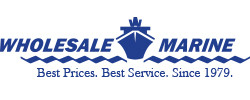If you use your boat, it is inevitable that you will eventually strike something with your propeller. Just running through the water, the propeller is being impacted by a multitude of un-seen floating debris hovering a few feet below the water surface. Whether you hit something hard or graze the bottom softly, you can change the blade geometry, bend or break them off completely, or chew up the edges. A damaged propeller will perform poorly, have decreased fuel economy, increase vibration, and may lead to engine damage.
The propeller is what moves your boat. Once you get the best propeller for your rig, you want to take care of it. Not only does the correct propeller get the boat on plane well, accelerates, corners, and lifts well, it also helps you save fuel. But only if it is in good shape.
While running your boat, if you notice a change in RPM or an increase in vibration, or feel the boat hit something (or think you might have hit something), stop the boat, turn off your engine, and raise your outboard or outdrive as high as it goes to look at the skeg and propeller. Make sure you remove the key and lanyard stop clip before approaching the propeller or entering the water to inspect the outdrive.
Check the propeller blade edges for cuts, notches, bent surfaces, or missing material. Inspect the skeg - is it bent, broken, or missing? All of these damages can result in significant decreases in performance or safe running conditions. If you see any major damage we recommend you replace the propeller as soon as possible. Running a severely bent propeller for a period of time can result in lower unit seal or bearing damage due to excessive vibration. Running a boat with a bent or missing skeg can have a significant impact on boat handling and maneuverability.
It is imperative as part of your end-of day checklist to inspect the condition of the propeller and skeg. Repair or replace the damaged item immediately, so your next outing doesn't become an expensive and time consuming lower unit repair.
Checking for Propeller Damage
By: TP. Engineering
